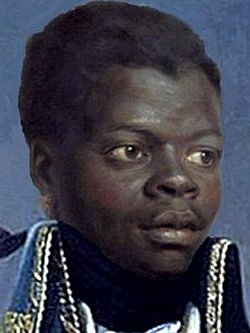
Cause of death: acute pneumonia
François-Dominique Toussaint Louverture (French: [fʁɑ̃swa dɔminik tusɛ̃ luvɛʁtyʁ], English: ) also known as Toussaint L'Ouverture or Toussaint Bréda (20 May 1743 – 7 April 1803), was a Haitian general and the most prominent leader of the Haitian Revolution. During his life, Louverture first fought and allied with Spanish forces against Saint-Domingue Royalists, then joined with Republican France, becoming Governor-General-for-life of Saint-Domingue, and lastly fought against Bonaparte's republican troops. As a revolutionary leader, Louverture displayed military and political acumen that helped transform the fledgling slave rebellion into a revolutionary movement. Along with Jean-Jacques Dessalines, Louverture is now known as one of the "Fathers of Haiti".
Toussaint Louverture was born as a slave in the French colony of Saint-Domingue, now known as Haiti. He was a devout Catholic, and was manumitted as an affranchi (ex-slave) before the French Revolution, identifying as a Creole for the greater part of his life. During his time as an affranchi, he became a salaried employee, an overseer of his former master's plantation, and later became a wealthy slave owner himself; Toussaint Louverture owned several coffee plantations at Petit Cormier, Grande Rivière, and Ennery. At the start of the Haitian revolution he was nearly 50 years old and began his military career as a lieutenant to Georges Biassou, an early leader of the 1791 War for Freedom in Saint-Domingue. Initially allied with the Spaniards of neighboring Santo Domingo, Louverture switched his allegiance to the French when the new Republican government abolished slavery. Louverture gradually established control over the whole island and used his political and military influence to gain dominance over his rivals.
Throughout his years in power, he worked to balance the economy and security of Saint-Domingue. Worried about the economy, which had stalled, he restored the plantation system using paid labor; negotiated trade agreements with the United Kingdom and the United States and maintained a large and well-trained army. Louverture seized power in Saint-Domingue, established his own system of government, and promulgated his own colonial constitution in 1801 that named him as Governor-General for Life, which challenged Napoleon Bonaparte's authority.
In 1802, he was invited to a parley by French Divisional General Jean-Baptiste Brunet, but was arrested upon his arrival. He was deported to France and jailed at the Fort de Joux. He died in 1803. Although Louverture died before the final and most violent stage of the Haitian Revolution, his achievements set the grounds for the Haitian army's final victory. Suffering massive losses in multiple battles at the hands of the British and Haitian armies and losing thousands of men to yellow fever, the French capitulated and withdrew permanently from Saint-Domingue the very same year. The Haitian Revolution continued under Louverture's lieutenant, Jean-Jacques Dessalines, who declared independence on 1 January 1804, thereby establishing the sovereign state of Haiti.
Source : Wikipedia